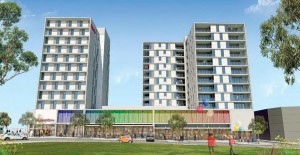(Source: Bloomberg)
Singapore property stocks are set for their best annual performance in five years, and strategists believe the rally is far from over. With an expected pickup in real estate following the easing of housing curbs, property developers are expected to be the bright spot in Singapore equities.
“The residential property market has seen a marked improvement in sentiment,” said Desmond Loh at JPMorgan Asset Management, who helps manage the second-best performing Singapore fund this year. Developers that have started buying land for new projects stand to benefit, he said, adding that vacancy rates are expected to decline over the next few years.
The government sparked renewed interest in the real estate market after it rolled back some curbs in March following a 3½-year slump in home prices, the longest stretch of declines since the data was first published in 1975. In the same month, housing sales surged to the highest in nearly four years as developers sold more than twice the number of homes compared with the previous year, government data showed.
Six of top 10 stocks are real estate companies
Property stocks including City Developments Ltd. and UOL Group Ltd. are already driving gains in Singapore stocks so far this year, with developers and property trusts making up more than half of the 10 best-performing stocks on the Straits Times Index. The city-state’s benchmark measure has climbed about 13% this year, while the gauge tracking 42 Singapore real estate stocks has jumped 17%, heading for its biggest annual gain since 2012.

“Prices are moving upwards again, albeit in a more gradual direction, market interest is more positive in terms of transactions,” said Andrew Gillan, head of equities for Asia excluding Japan at Janus Henderson Group, which has about $330.8 billion assets under management globally. “That’s going to bode relatively well for earnings,” he added, pointing to developers that have accumulate land at “reasonable” costs.
Government land sales are drawing investor interest. A residential plot last month fetched a record price in a government sale, with a Chinese consortium bidding S$1 billion ($723 million). Other developers are adding land by buying up existing apartment buildings for redevelopment in so-called en-bloc sales. Four of these deals – where a group of owners band together to sell entire apartment blocks at a hefty premium – have been struck this year, with a combined value of S$1.5 billion.
Still, the recovery in home sales hasn’t been consistent. Government data last week showed Singapore home sales fell 34% in May as fewer new projects were marketed, and a further increase in housing transactions may also prompt more curbs or slow the relaxation of them.

The risk is “if volume really start to pick up quite strongly, then we will see more measures from the Monetary Authority of Singapore,” said Mixo Das, Nomura’s Southeast Asian equity strategist, referring to the city-state’s central bank. “That’s something I can’t rule out, it’s certainly a possibility.”
That may also add to the headwinds limiting gains in the overall Singapore market. The Straits Times Index’s valuation is “looking a bit high” versus historical levels and some of its regional peers, which would cap further increases this year at 3% to 5% at best, said Carmen Lee, head of research at Oversea-Chinese Banking Corp (OCBC).
While property stocks aren’t as cheap as they were six to nine months ago, most are still trading at a discount to their book value and will outperform the overall market, she said. The Singapore property stock index is trading at a price-to-book value of 0.89, and last traded at par four years ago, according to Bloomberg.
The optimism for home sales this year also comes as investor sentiment improved in the city-state on the back of a recovery in export demand that prompted the government to give an upbeat outlook on the economy in May, saying it will probably expand more than 2% this year.
“We’re in a recovery phase at this point,” said Sean Gardiner, an equity strategist at Morgan Stanley Singapore. “There are a number of macro prudential measures that are still weighing on the real estate market but we are definitely up from the bottom we saw early last year.”




